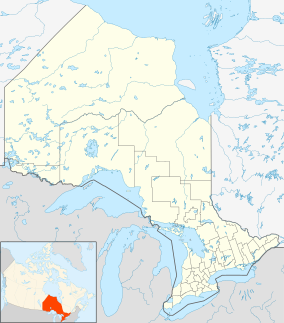Crawford Lake
| Crawford Lake Conservation Area | |
|---|---|

Crawford Lake
|
|
| Location | Milton, Halton, Ontario, Canada |
| Nearest city | Campbellville |
| Coordinates | 43°28′N 79°57′W / 43.467°N 79.950°WCoordinates: 43°28′N 79°57′W / 43.467°N 79.950°W |
| Area | 232 acres (94 ha) |
| Established | 1969 |
| Governing body | Conservation Halton |
| www |
|
Crawford Lake Conservation Area is a conservation area owned and operated by Conservation Halton near the community of Campbellville in Milton, Halton, Ontario, Canada. It is categorized as a regional environmentally sensitive area, an Ontario Area of Natural and Scientific Interest, and part of the Niagara escarpment world biosphere reserve. The conservation area contains Crawford Lake, a reconstructed Iroquoian village, and several hiking trails.
A study made in 1971 determined that the lake was meromictic, which makes the lake a prime site for archaeological and geochemical studies. Using pollen analysis, reconstruction of the history of the area over several hundred years was possible. Moreover, geochemical analysis of sediment cores has allowed for the reconstruction of the pollution history of the area. This analysis revealed the trends and sources of air pollution over approximately 150 years.
The pollen analysis revealed corn pollen, indicating a possible Iroquoian settlement nearby, as corn was a staple of their agriculture. A search of the surrounding area found a grindstone, which would have been used in such a village. Digs of the area just south of the grindstone revealed the foundations of an eleven-longhouse village. The village, thought to be inhabited by either the Wendat (Huron) or Neutral Confederacy peoples, has been reconstructed in the conservation area and is based on many years of research by archaeologists, who continue to study the site. The reconstructed fifteenth century Iroquoian village is open seasonally and for special events. The site offers interpretive programs of Iroquoian life and culture and has three reconstructed longhouses and a palisade, although the original village did not have a palisade. One longhouse is used to display contemporary indigenous art and artifacts recovered from past digs. The longhouses are representative of life in the village at the time, with fireplaces, fur-lined bunk beds, and various items used at the time.
...
Wikipedia

